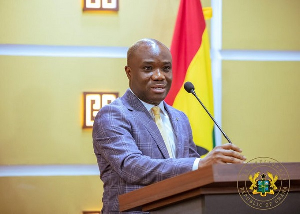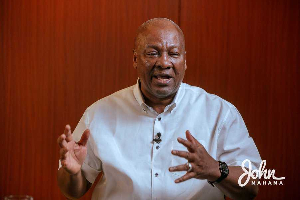Cape Coast, June 29, GNA - Mr David Adeenze-Kangah, Deputy Chairman of the Electoral Commission (EC), said at the weekend that non-functioning and "ghost" political parties would be expunged from the electoral register.
He said the period for nurturing political parties was over, adding "we will strictly enforce the Political Parties Act 574 and other relevant legislation on the operations of political parties in the country to ensure that sanity prevails on the national political front". Speaking to newsmen at Cape Coast during a three-day seminar on the theme "Dialogue with Media on 2008 Election Reportage," Mr. Adeenze-Kangah called on the media to support the EC to clear "ghost" political parties that are not functioning from its records. He explained that the Commission in 2007 undertook an exercise on the "Assessment of the Political Parties," which involved nationwide visits to the premises of all registered political parties to inspect their books and assess their operations.
Mr. Adeenze-Kangah said the next phase of the exercise which was suspended due to the 2008 Elections, was aimed at clearing all non-functioning political parties.
He said some of the parties had changed their registration locations, executive members, and amended their Constitutions but had failed to notify the Commission.
Others had also closed their offices, failed to elect national, regional, and constituency executives and had not participated in any electoral activity since the 2000 general election, Mr Adeenze-Kangah noted. He said Act 574 mandated every political party to participate in shaping the political will of the people, disseminate information on political ideas, undertake social and economic programmes of a national character, and sponsor candidates for public elections other than elections to District Assemblies or lower local government units. The law also prohibits the formation of political parties based on ethnic or religious lines. "No political party shall be formed on ethnic, gender, religious, regional, professional or other sectional divisions, or uses words, slogans or symbols which could create ethnic, gender, regional, professional or other sectional divisions," he stated. Mr Adeenze-Kangah said the law also indicates that a political party's internal organization should conform to democratic principles and its actions and purposes should not be contrary to or inconsistent with the Constitution.
Mr Eric A. Opoku, a Governance Programme Analyst of the United Nations Development Programme (UNDP), sponsors of the seminar, commended the media for their contribution towards the success of last year's elections. Other speakers included Mr. S. Yorke Aidoo, EC Director of Human Resource and General Service, and Mr. Christian Owusu-Parry, Acting Director of Public Affairs. 29 June 09
Politics of Monday, 29 June 2009
Source: GNA
















